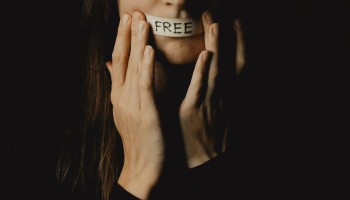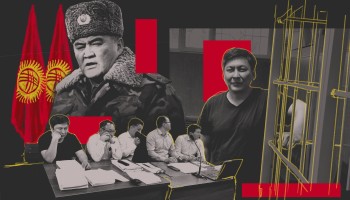The case against Kloop, an OCCRP-affiliated media outlet, was launched a year ago when the prosecutor’s office sought to dissolve the Kloop Media Public Foundation claiming that by running the Kloop outlet it had been operating beyond the limits set by its charter.
The New York-based Committee to Protect Journalists (CPJ), as well as other press freedom watchdogs, strongly condemned the court’s decision, urging Kyrgyz authorities to reverse it immediately and to end “their campaign of pressure against the independent press.”
Yet, President Sadyr Japarov sees things differently.
In an interview with the state agency Kabar, the President also addressed the Supreme Court’s decision from July this year to liquidate the foundation and close its bank accounts.
Japarov insisted that shutting down Kloop “will not affect freedom of speech in Kyrgyzstan,” claiming that the court’s decision was based on the outlet’s bias investigations, which he said were aimed at “denigrating someone.”
While he did not specify examples to back his claims, he strongly asserted that the state stands behind any journalistic investigations, as long as they are “fair and impartial.”
Kloop is still publishing its content on a website that is under a different foundation.
The outlet’s statement said that the Supreme Court took over a month to announce its decision. During this time, Kloop’s lawyers said that their calls went unanswered and no copy of the decision was provided.
Kloop then formally requested an explanation from the Supreme Court as to why the lawyers and the foundation were not promptly informed of the decision.
The court has so far remained silent on the journalists’ request for clarification.
Kloop’s co-founder, Rinat Tukhvatshin, described the ruling as “expected,” but vowed that the media outlet will persist in its reporting efforts despite the setback.
Beyond the pressure on Kloop, independent reporters and media outlets across Kyrgyzstan are experiencing increasing scrutiny and challenges.
Earlier this month, Kyrgyzstan’s Ministry of Culture instructed independent reporter and editor-in-chief of New Faces media outlet, Leila Saralaeva, to remove her investigation from the outlet’s website.
Saralaeva’s report detailed the involvement of a Russian political strategist, linked to late oligarch and mercenary leader Yevgeny Prigozhin, who allegedly supported President Japarov’s 2021 campaign. The Ministry claimed the investigation contained “false information,” but provided no evidence to substantiate its allegation.
The Ministry also warned Radio Azattyk, which had republished Saralaeva’s story, to remove it, citing the same reason—false information.
Meanwhile, the Bishkek city court has ruled to keep four current and former reporters from OCCRP’s partner media outlet, Temirov Live, behind bars.
In January this year, Kyrgyz authorities detained 11 independent journalists and searched their homes, accusing nine of them of inciting mass riots. Four of the journalists remain in jail, six are under house arrest, and charges were dropped against one, though strict travel restrictions remain in place.
Despite appeals from the lawyers, the decision was upheld, keeping the journalists in pre-trial detention until October 8, when the court will either extend their detention or deliver a verdict.






